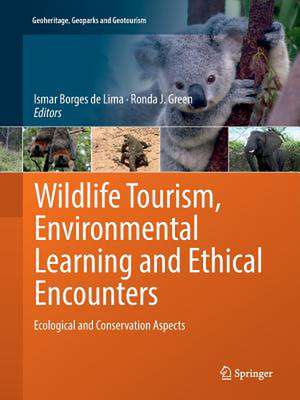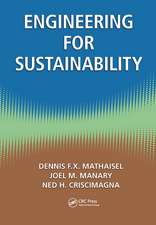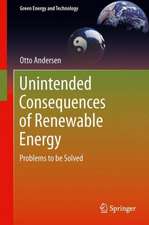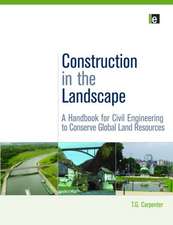Wildlife Tourism, Environmental Learning and Ethical Encounters: Ecological and Conservation Aspects: Geoheritage, Geoparks and Geotourism
Editat de Ismar Borges de Lima, Ronda J. Greenen Limba Engleză Paperback – 2 aug 2018
Examining the intricacies, challenges, and lessons learned in a meaningful and rewarding tourism niche, this interdisciplinary book comprehensively examines the major potentials and controversies in the wildlife tourism industry. Pursuing an insightful, provocative and hands-on approach, it primarily addresses two questions: ‘Can we reconcile the needs of the wildlife tourism industry, biodiversity conservation, ecological learning and animal ethics issues?’ and ‘What is the Future of the Wildlife Tourism Industry?’.
Though primaril
y intended as a research text, it also offers a valuable resource for a broad readership, which includes university and training students, researchers, scholars, tourism practitioners and professionals, planners and managers, as well as the staff of government agencies.
| Toate formatele și edițiile | Preț | Express |
|---|---|---|
| Paperback (1) | 1117.50 lei 43-57 zile | |
| Springer Nature Switzerland – 2 aug 2018 | 1117.50 lei 43-57 zile | |
| Hardback (1) | 922.50 lei 38-44 zile | |
| Springer Nature Switzerland – 30 iun 2017 | 922.50 lei 38-44 zile |
Din seria Geoheritage, Geoparks and Geotourism
- 15%
 Preț: 593.42 lei
Preț: 593.42 lei - 18%
 Preț: 953.65 lei
Preț: 953.65 lei - 18%
 Preț: 782.87 lei
Preț: 782.87 lei -
 Preț: 203.66 lei
Preț: 203.66 lei -
 Preț: 351.88 lei
Preț: 351.88 lei - 23%
 Preț: 813.13 lei
Preț: 813.13 lei - 15%
 Preț: 650.19 lei
Preț: 650.19 lei - 24%
 Preț: 731.33 lei
Preț: 731.33 lei - 20%
 Preț: 578.29 lei
Preț: 578.29 lei - 24%
 Preț: 761.70 lei
Preț: 761.70 lei - 24%
 Preț: 922.50 lei
Preț: 922.50 lei - 24%
 Preț: 808.03 lei
Preț: 808.03 lei - 24%
 Preț: 912.08 lei
Preț: 912.08 lei - 24%
 Preț: 862.50 lei
Preț: 862.50 lei - 24%
 Preț: 758.99 lei
Preț: 758.99 lei - 20%
 Preț: 568.43 lei
Preț: 568.43 lei
Preț: 1117.50 lei
Preț vechi: 1362.82 lei
-18% Nou
Puncte Express: 1676
Preț estimativ în valută:
213.84€ • 223.82$ • 177.98£
213.84€ • 223.82$ • 177.98£
Carte tipărită la comandă
Livrare economică 31 martie-14 aprilie
Preluare comenzi: 021 569.72.76
Specificații
ISBN-13: 9783319856988
ISBN-10: 3319856987
Pagini: 292
Ilustrații: XIII, 292 p. 84 illus., 60 illus. in color.
Dimensiuni: 210 x 279 mm
Greutate: 0.69 kg
Ediția:Softcover reprint of the original 1st ed. 2017
Editura: Springer Nature Switzerland
Colecția Springer
Seria Geoheritage, Geoparks and Geotourism
Locul publicării:Cham, Switzerland
ISBN-10: 3319856987
Pagini: 292
Ilustrații: XIII, 292 p. 84 illus., 60 illus. in color.
Dimensiuni: 210 x 279 mm
Greutate: 0.69 kg
Ediția:Softcover reprint of the original 1st ed. 2017
Editura: Springer Nature Switzerland
Colecția Springer
Seria Geoheritage, Geoparks and Geotourism
Locul publicării:Cham, Switzerland
Cuprins
Wildlife tourism management and phenomena: a web of complex conceptual, theoretical and practical issues.- A political ecology of the yellow-eyed penguin in Southern New Zealand: a conceptual and theoretical approach.- The intersections between lacustrine wildlife, tourism and conservation: scientific and educational opportunities in the Brazilian southern lakes.- Wildlife Tourism for Visitors' Learning Experiences: Some Evidences on the Royal Bengal Tiger in Bangladesh and in India.- Whale and dolphin watching, and visitors' experiential responses: a qualitative study on comments in a travel forum.- Will the Ark sink? Captive Wildlife, Tourism and the Human Relationship to Nature: Demystifying Zoos.- Wildlife tourism, a multidisciplinary field of inquiries and insights: final considerations.
Notă biografică
Ismar Borges de Lima is currently an associate professor at the State University of Roraima (UERR), Brazil, and an Adjunct Lecturer at Southern Cross University (SCU), Australia, where he also did his postdoc studies in 2015 at the School of Business and Tourism with research on wildlife tourism and environmental interpretation in parks. He is a Ph.D. holder in the field of Geography & Tourism, a degree awarded in 2008 by the University of Waikato, in New Zealand.
Ronda holds a PhD in zoology and has conducted much ecological and behavioural research over the years, especially seed dispersal by fruit-eating animals and the effects of habitat alteration on wildlife, also play behaviour of chimpanzees and various aspects of wildlife tourism. She has had extensive experience in nature interpretation for all ages, having run a holiday farm, worked as ranger in charge of interpretive activities, lectured at university and adult education classes, among others. S
he is currently chair of Wildlife Tourism Australia and Scenic Rim Wildlife.Textul de pe ultima copertă
This book outlines the status quo of worldwide wildlife tourism and its impacts on planning, management, knowledge, awareness, behaviour and attitudes related to wildlife encounters. It sets out to fill the considerable gaps in our knowledge on wildlife tourism, applied ecology, and environmental education, providing comprehensive information on and an interdisciplinary approach to effective management in wildlife tourism.
Examining the intricacies, challenges, and lessons learned in a meaningful and rewarding tourism niche, this interdisciplinary book comprehensively examines the major potentials and controversies in the wildlife tourism industry. Pursuing an insightful, provocative and hands-on approach, it primarily addresses two questions: ‘Can we reconcile the needs of the wildlife tourism industry, biodiversity conservation, ecological learning and animal ethics issues?’ and ‘What is the Future of the Wildlife Tourism Industry?’.
Though primarily in
tended as a research text, it also offers a valuable resource for a broad readership, which includes university and training students, researchers, scholars, tourism practitioners and professionals, planners and managers, as well as the staff of government agencies.
Examining the intricacies, challenges, and lessons learned in a meaningful and rewarding tourism niche, this interdisciplinary book comprehensively examines the major potentials and controversies in the wildlife tourism industry. Pursuing an insightful, provocative and hands-on approach, it primarily addresses two questions: ‘Can we reconcile the needs of the wildlife tourism industry, biodiversity conservation, ecological learning and animal ethics issues?’ and ‘What is the Future of the Wildlife Tourism Industry?’.
Though primarily in
tended as a research text, it also offers a valuable resource for a broad readership, which includes university and training students, researchers, scholars, tourism practitioners and professionals, planners and managers, as well as the staff of government agencies.
Caracteristici
Fills a gap in the literature by discussing ‘wildlife tourism’, ‘ecological issues’, and ‘environmental education and interpretation’ as intertwined themes Comprehensively examines the major potentials and controversies in the wildlife tourism industry Presents an interdisciplinary approach to effective management for best practices in wildlife tourism and serves to inspire individuals, companies, government bodies, institutions and organisations to innovate Sheds new light on the importance of using ‘tourism’ as a tool and driver for ecological security and environmental learning Pursues an insightful, provocative and hands-on approach Includes supplementary material: sn.pub/extras











